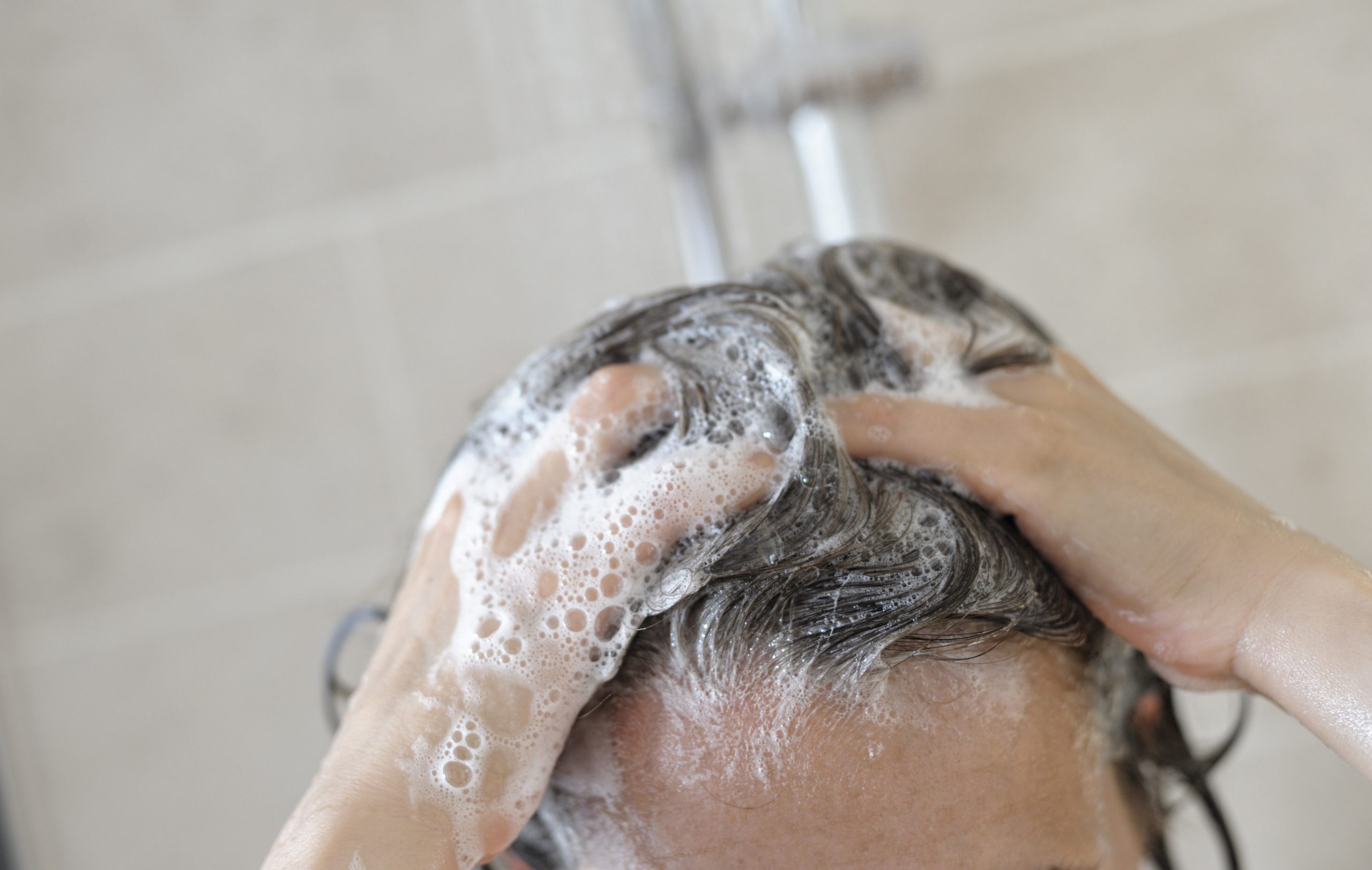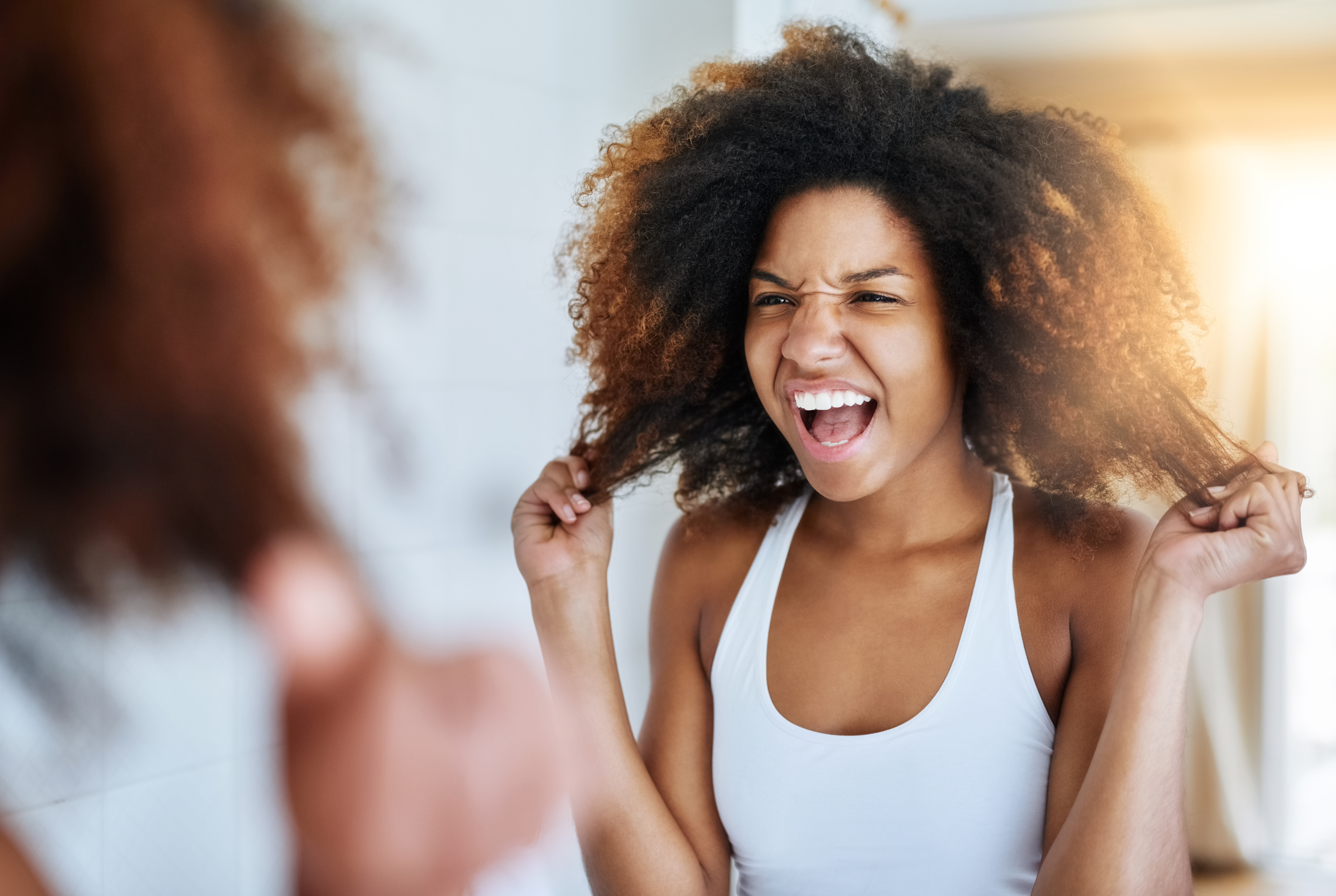
If you're asking yourself how to get rid of greasy hair, you're certainly not alone.
Most people struggle with greasy hair between washes or after a session at the gym, but for some of us it's a constant battle, and it feels like your only weapons are constant hair washing, or more dry shampoo than one human should ever need.
Greasy hair can affect you more during times of stress, during puberty, and also during ovulation - which is why medical conditions such as polycystic ovary syndrome can make greasy hair worse as well. However, whatever the cause of your oiliness, there are solutions out there, and you don't have to put up with it any more.
So, why might you be getting greasy hair - even if you're regularly washing it? And, how can we fix it? We spoke to various hairdressers and hair experts, including Anabel Kingsley, trichologist at Philip Kingsley, to get to grips with grease and learn how to get rid of greasy hair once and for all... and we bet at least a couple of her tips will surprise you!
How to preventof greasy hair
1. Ditch your hairbrush
It might come as a surprise, but your hairbrush could well be responsible for any greasy hair you experience. Hair brand Tresemme revealed, "Bristle brushes tend to distribute product and oil down the length of the hair shaft, exacerbating oily-looking locks."
They recommend using a wide-toothed comb instead, which will distribute less oil through the hair.
2. Stop using the wrong hair products
According to celebrity hairdresser Phil Smith, there are a myriad of reasons your hair may be greasier than you might expect.
Parenting advice, hot topics, best buys and family finance tips delivered straight to your inbox.
For those of us who find it incredibly frustrating when hair seem greasy soon after you get out of the shower, the problem may lie in your chosen products. He told GoodtoKnow, 'If you’re finding your hair is greasy right after washing it it’s likely that you are using products that are too heavy for your hair type and/or applying them incorrectly.'
Anabel also agreed, 'If your hair is dry and fine or dry and medium textured, do not swap out your regular shampoo and conditioner for overly heavy ones,' Anabel advises. 'This is likely to make your strands look oily and flat.' She suggests addressing dryness and brittleness with an intensive pre-shampoo conditioner instead.
'As these are left on the hair for long enough to penetrate, with any excess residue then being washed away, they add intensive moisture without weighing the hair down.'
Make sure to wash products out thoroughly
Kirsten and Valerie Maine, Salon Directors at Live True London explained that products that haven't been roperly scrubbed out of your barnet could also be making it look greasy.
They said to GoodtoKnow, 'Not rinsing your hair well enough after a shampoo or conditioner will cause a build up of product even after you wash your hair which can make your hair feel as though it is greasy.'
We'd recommend a shampoo after you condition, which will will help to clear any build up left behind by your styling products and any thick conditioner you may use.
3. Exfoliate your scalp
Nope, we didn't know this was a thing either - but apparently it can make a big difference to the overall appearance of your hair. According to Anabel, you should use an exfoliating scalp mask, like the Philip Kingsley Exfoliating Scalp Mask, once a week, to remove dead skin cells and to help keep your scalp in optimal condition. 'Again, zinc is an excellent ingredient to look for as it helps to control sebum (oil) production,' she says.
4. Get your hair washing schedule - and the time of day - right
How often you should wash your hair depends from person to person. 'People with naturally fine hair tend to get greasy hair faster than those with other hair textures. This is because individuals with fine hair have more hairs per square centimetre - and each hair has a sebaceous (oil) gland attached to it. As a result, the scalp produces more oils,' says Anabel.
Phil Smith recommends that every day is too much. And if you're worried that your hair will look greasy if you don't wash it every day, he suggests that it's a period you may have to rid out for glossier locks in the long run.
He explained, 'If it’s every day then it’s definitely too much. Washing hair strips out natural oils so to compensate we start producing even more which is why by the end of the day you feel you need to wash it again.
'It’s a Catch 22 and a cycle that you need to persevere in order to break. My Dry Cleaners will work wonders here, using these on in between days to draw out excess oil and try to limit hair washes to a maximum of 3 a week.'
Hair brand Tresemme also advise that if you're an evening hair-washer, you may want to reconsider. While we sleep, our bodies are still working hard, meaning that your hair is even getting greasy as you sleep. They said: 'While you sleep, the oil-producing glands in your scalp are hard at work making sebum (your hair's natural oils). And yep, you guessed it: this is the stuff that coats your hair and makes it look greasy.
'If your scalp over-produces sebum, sometimes you might find your hair looking oily even when you've just got out of bed. It might sound obvious, but the best way to battle morning grease is to wash your hair in the morning instead of at night.'
5. Don't apply conditioner to your roots
You might think that conditioner will make your hair look glossy, not greasy, but according to experts, it can often have the opposite effect. 'Applying conditioner too close to the roots is one of the most common causes of lank and dull looking hair that we see,' says Anabel. 'Only apply it to the mid-lengths and ends where the hair is older and needs moisture the most.'
Pick dry shampoo with care
'If your roots are looking oily, it's really best just to wash your hair. It doesn't take long and you will be doing your hair a world of good, as hair grows best from a clean and healthy scalp,' Anabel explains. However, if you don't have time (or can't be bothered) to wash your hair properly, use a lightweight dry shampoo with both hair and scalp benefits.
Anabel recommends picking a product containing Zinc PCA, which can help to prevent flakes and regulate the production of sebum.

Credit: Getty
6. Stop touching it!
'Constantly playing with or touching your hair can transfer oils and dirt on your hands onto your strands. This can make hair appear greasy and dull, as well as weigh the roots down,' Anabel says - so if you're a hair twirler, a frequent restyler, or a constant tuck-behind-the-ears kind of gal, it's time to break the habit!
Phil explained: 'Think about everything your hands are touching throughout the day and imagine it being absorbed by your hair.' Yuck!
Amy is Senior Digital Writer across Woman & Home, GoodTo and Woman, writing about everything from celebrity news to health, fashion and beauty features. When she isn't obsessing over the latest dress drop from Marks & Spencer, you'll most likely find Amy out running, or with a cup of tea in hand ready to dive into a gripping new Netflix series.